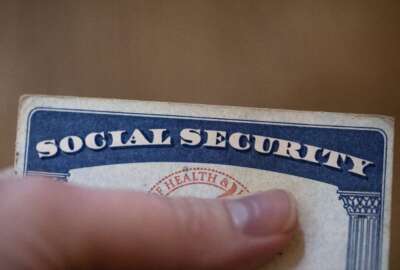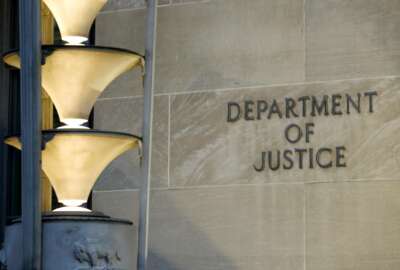Biden COVID plan directs more federal employees to resume in-person work in April
The Biden administration is looking to the federal workforce to set an example for the rest of the country’s labor force by having more federal employees return...
The Biden administration is looking to the federal workforce to set an example for the rest of the country’s labor force by having more federal employees return to the office in April.
The administration, in a National COVID-19 Preparedness Plan released Wednesday, said “federal agencies will lead by example” for a new stage of the COVID-19 pandemic.
The plan calls for agencies to increase the hours that public-facing federal offices are open for in-person appointments and services in April.
“This plan lays out the roadmap to help us fight COVID-19 in the future as we move America from crisis to a time when COVID-19 does not disrupt our daily lives and is something we prevent, protect against, and treat,” the plan states.
President Joe Biden previewed this vision for the federal workforce during his State of the Union address on Tuesday, when he said the “vast majority of federal workers will once again work in person.”
The administration, meanwhile, is asking Congress for $22.5 billion in supplemental funding for fiscal 2022 to support a new wave of COVID-19 programs, and expects to eventually ask lawmakers for additional funding on top of that amount.
White House Coronavirus Response Coordinator Jeff Zients told reporters Wednesday that the work of federal employees fighting COVID-19 means “people working from home can feel safe to begin to return to the office.”
“Across the coming weeks, the vast majority of federal workers will once again work in person. You’ll see public-facing federal government offices open for longer hours, more in-person appointments and walkup services,” Zients said.
Zients said the administration is also working with Congress to provide paid sick leave to workers who need to miss work when they or a loved one has COVID. He said the administration is also looking at reinstating tax credits to help small and midsize businesses provide paid sick and family leave.
OMB asks for $22.5B for new wave of COVID-19 programs
The administration’s new COVID plans outline a sweeping new agenda for how federal agencies will respond to the current stage of the pandemic.
But to get the plan’s goals off the ground, the Office of Management and Budget is asking Congress for an additional $22.5 billion to cover “immediate needs” for the federal government’s COVID-19 response over the next few months.
Acting OMB Director Shalanda Young, in a letter to House Speaker Nancy Pelosi (D-Calif.), said this funding would pay for COVID-19 testing, treatments and vaccines.
Young said the funding would also help jump-start work “on a next-generation vaccine that protects against future variants” of COVID-19.
More than $18 billion of the requested supplemental funds would go to the Department of Health and Human Services, while more than $4 billion would go to the State Department and USAID to support international vaccine efforts.
However, OMB expects the administration will need additional funding beyond its supplement request.
Young said the agency will provide more information to Congress about “anticipated resource needs in the weeks ahead.”
“We will need additional funding beyond these immediate needs to effectively execute on the medium- and longer-term priorities and policies in today’s plan,” Zients told reporters.
Among the plans that affect federal agencies, the administration plans to launch a “One-Stop Test to Treat” program that would allow people to get tested for COVID and, if they test positive, receive antiviral pills on the spot at no cost.
The administration plans to open hundreds of Test to Treat sites at Department of Veterans Affairs facilities later this month, as well as at pharmacy clinics, community health centers and long-term care facilities.
The administration will also allow households to order a second round of free rapid COVID tests at CovidTests.gov, even if they already ordered free tests through the site.
HHS Secretary Xavier Beccera meanwhile, told reporters that the agency plans to launch new Centers of Excellence that would provide care to Americans experiencing Long COVID “and better understand the symptoms they’re facing.”
HHS also plans to make its vaccination logistics and operational hub, the HHS Coordination Operations and Response Element (HCORE), a permanent element of the agency.
HHS stood up HCORE when it assumed full ownership of federal plans to develop, manufacture, and distribute COVID-19 vaccines from the Defense Department’s Operation Warp Speed.
“No matter what the future holds, HCORE must be ready, and Americans deserve to know that we have the infrastructure in place to get critical services and supplies where they are needed,” Beccera said.
The Government Accountability Office, however, recently said it remains unclear whether HHS is ready to lead some efforts under Operation Warp Speed that used to be led by DoD.
GAO says HHS will need additional contractors to keep up with this work, but HHS told auditors that it assessed its workforce capacity before taking over the project at the start of 2022.
Copyright © 2025 Federal News Network. All rights reserved. This website is not intended for users located within the European Economic Area.
Jory Heckman is a reporter at Federal News Network covering U.S. Postal Service, IRS, big data and technology issues.
Follow @jheckmanWFED






